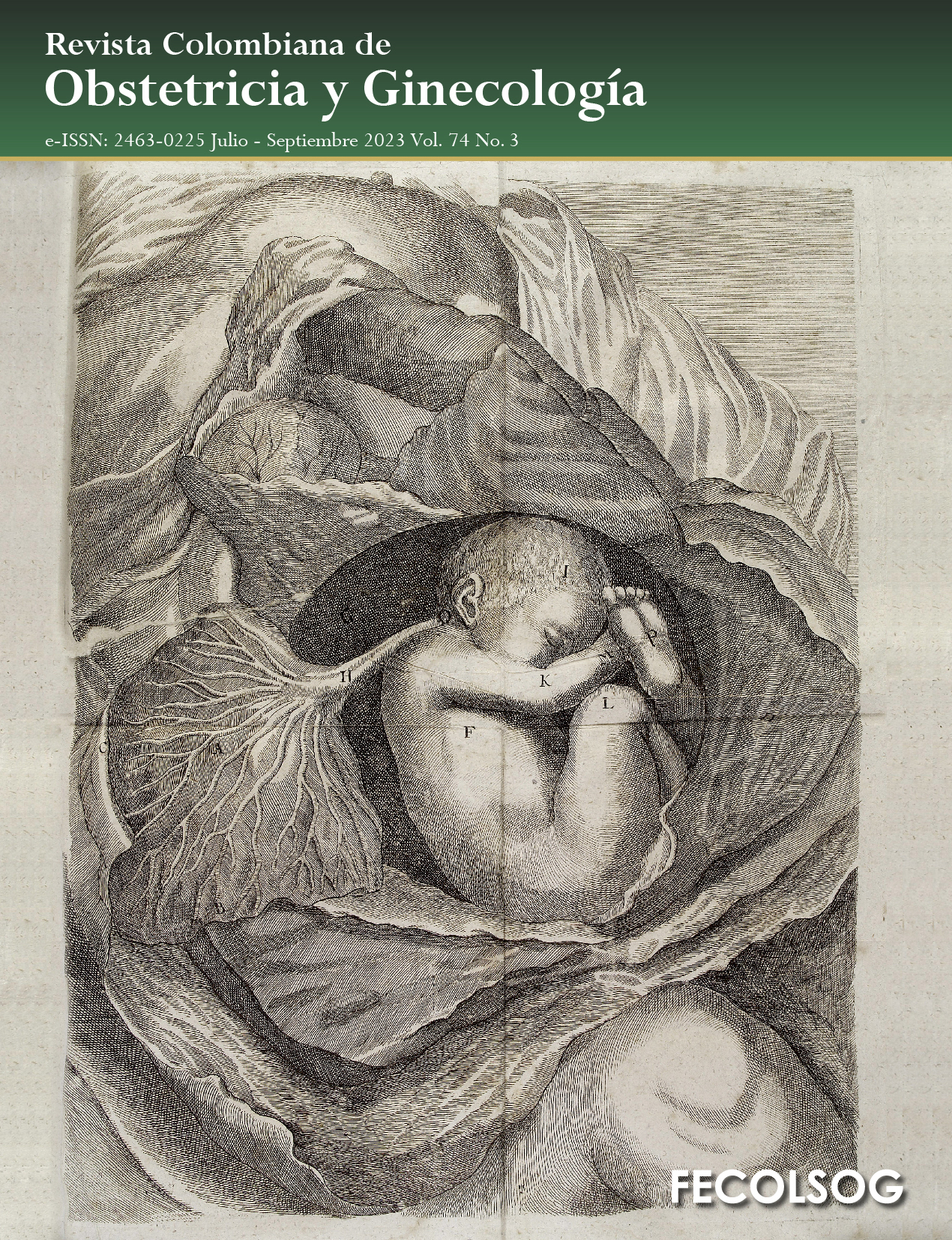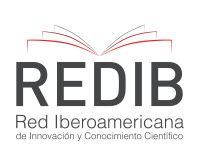Meaning of having to cope with voluntary termination of late pregnancy in women undergoing the procedure in healthcare institutions of two Colombian cities
DOI:
https://doi.org/10.18597/rcog.4016Keywords:
Reproductive health, legal abortion, reproductive rights, abortion applicants, violence against women, induced abortion, gender-based violence, obstetric violenceAbstract
Objectives: As part of sexual and reproductive health, abortion is a woman’s right in Colombia. However, not all the members of Colombian society recognize this right. The aim of this work is to understand the transformation of meanings after having to cope with voluntary termination of late pregnancy in women living in Colombia, as well as their interaction with family and friends and the health system.
Material and methods: Hermeneutic research undertaken within a constructivist paradigm and analyzed from a feminist perspective using grounded theory techniques: coding, categorization and constant comparison. Nineteen semi-structured interviews were conducted among 18 women living in Colombia who underwent voluntary termination of late pregnancy defined as more than 20 weeks of gestation, accompanied by feticide and labor induction, in two Colombian cities between 2016 and 2020. Besides, two focus groups were conducted, one with some of the interviewees and another with feminist experts in order to cross-reference the information derived from the research process and delve deeper into the findings.
Results: Women attached a negative and opposite meaning to voluntary termination of pregnancy, but once they found themselves in a situation that forced them to put an end to gestation, they transgressed their own meanings and those of society to find justifications to help them uphold their decision. This confrontation brought them to a place of profound and intimate reflection and led them to transform their lives.
Conclusions: Meanings regarding abortion in women who undergo late pregnancy termination are usually contrary to this right in sexual and reproductive health. After the event, these meanings become transformed through a process of conscious reflection as women come face-to-face with their own meanings and those of society.
Author Biographies
Joaquín Guillermo Gómez-Dávila, Universidad de Antioquia, Medellín (Colombia).
Profesor Facultad de Medicina Universidad de Antioquia, Medellín (Colombia).
Carlos Enrique Yepes-Delgado, Universidad de Antioquia, Medellín (Colombia).
Profesor Facultad de Medicina Universidad de Antioquia, Medellín (Colombia).
References
Organización Mundial de la salud. Aborto sin riesgos: guía técnica y de políticas para sistemas de salud. Ginebra: OMS; 2012. 123 p.
Corte Constitucional de Colombia. Sentencia C-355/06. Interrupción voluntaria del embarazo (IVE). Bogotá: Corte Constitucional de Colombia; 2006.
Corte Constitucional de Colombia. Sentencia C-055/22. Demanda de inconstitucionalidad contra el artículo 122 de la Ley 599 de 2000. Bogotá: Corte Constitucional de Colombia; 2022. 34 p.
González A, Castro L. La Mesa por la Vida y la Salud de las Mujeres. Barreras de acceso a la interrupción voluntaria del embarazo en Colombia [Internet]. Bogotá; 2016. Disponible en: https://ngx249.inmotionhosting.com/~despen5/wp-content/uploads/2019/02/12.-Barreras_IVE_vf_WEB.pdf
Cocomá A, Triviño C, Rosero C, Ortiz J, Pedraza L, Ríos M, et al. La Mesa por la Vida y la Salud de las Mujeres. Barreras de acceso a la interrupción voluntaria del embarazo en el contexto de la pandemia por covid-19 [Internet]. Bogotá; 2021. Disponible en: https://despenalizaciondelaborto.org.co/wp-content/uploads/2021/08/Informe-barreras-covid-versiondigital-definitiva.pdf
Kapp N, Lohr P. Modern methods to induce abortion: Safety, efficacy and choice. Best Pract Res Clin Obstet Gynaecol. 2020;63:37-44. https://doi.org/10.1016/j.bpobgyn.2019.11.008
DePiñeres T, Baum S, Grossman D. Acceptability and clinical outcomes of first- and second-trimester surgical abortion by suction aspiration in Colombia. Contraception. 2014;90(3):242-8. https://doi.org/10.1016/j.contraception.2014.05.002
Ferreira da Costa L, Hardy E, Duarte J, Faúndes A. Termination of pregnancy for fetal abnormality incompatible with life: Women’s experiences in Brazil. Reprod Health Matters. 2005;13(26):139-46. https://doi.org/10.1016/S0968-8080(05)26198-0
Lafarge C, Mitchell K, Fox P. Termination of pregnancy for fetal abnormality: A meta-ethnography of women’s experiences. Reprod Health Matters. 2014;22(44):191-201. https://doi.org/10.1016/S0968-8080(14)44799-2
Leichtentritt R. Silenced voices: Israeli mothers’ experience of feticide. Soc Sci Med. 2011;72(5):747-54. https://doi.org/10.1016/j.socscimed.2010.12.021
Schutz A. La construcción de la vivencia significativa en la corriente de la conciencia de quien la constituye. En: La construcción significativa del mundo social [Internet]. Barcelona: Paidós; 1993. p. 75-125. Disponible en: https://camporeligioso.files.wordpress.com/2014/05/schutz-alfred-la-construccion-significativa-delmundosocial.pdf
Tufani A. Colombia. Iglesia condena despenalización del aborto: una afrenta a la dignidad humana. Vatican News [Internet]. 2022. Disponible en: https://www.vaticannews.va/es/iglesia/news/2022-02/colombiaiglesia-despenalizacion-aborto-afrenta-a-la-vidahumana.html
Strauss A, Corbin J. Bases de la investigación cualitativa: técnicas y procedimientos para desarrollar la teoría fundamentada. Medellín: Editorial Universidad de Antioquia; 2002. 340 p.
Galeano M, editora. Teoría fundada: arte o ciencia. En: Estrategias de investigación social cualitativa. Medellín: La carreta editores; 2015. p. 161-186.
Blumer H. El interaccionismo simbólico; perspectiva y método. Barcelona: Hora; 1982. 164 p.
Morse J, editor. Critical issues in qualitative research methods. Thousand Oaks: Sage; 1993. 401 p.
Harding S. ¿Existe en método feminista? En: Bartra E, editor. Debates en torno a una metodología feminista. 2nd ed. México D.F.: UNAM; 2002. p. 9-34.
Charmaz K. Constructing grounded theory: A practical guide through qualitative analysis. Vol. 10, Book; 2006. 208 p. https://doi.org/10.1177/1363459306067319
Glaser B. Conceptualization: On theory and theorizing using grounded theory. Int J Qual Methods. 2002;1(2):23-38. https://doi.org/10.1177/160940690200100203
Yeasmin S, Rahman KF. “Triangulation” research method as the tool of social science research. BUP J. 2012;1:154-63.
Morse J, Noerager P, Corbin J, Bowers B, Charmaz K, Clarke A. Developing grounded theory: The second generation. New York: Routledge; 2009. 280 p.22.
Bourdieu P. El oficio de científico: ciencia de la ciencia y reflexividad: curso Collège de France 2000-2001. Barcelona: Anagrama; 2003. 212 p.
How to Cite
Downloads
Downloads
Published
Issue
Section
License
Copyright (c) 2023 Revista Colombiana de Obstetricia y Ginecología

This work is licensed under a Creative Commons Attribution-NonCommercial-NoDerivatives 4.0 International License.
Funding data
| Article metrics | |
|---|---|
| Abstract views | |
| Galley vies | |
| PDF Views | |
| HTML views | |
| Other views | |
















